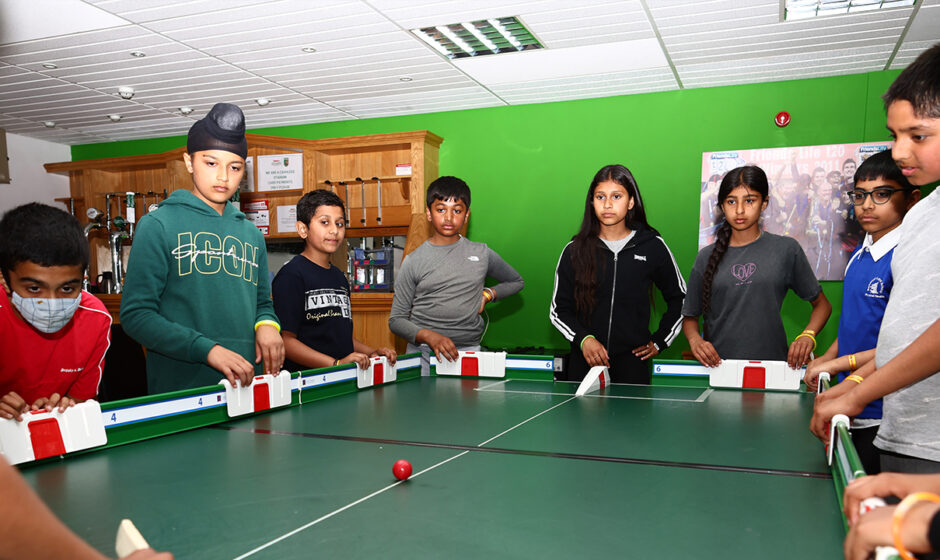In celebration of the International Day of Persons with Disabilities, we’re highlighting one of our most popular initiatives, Table Cricket, and its role in advancing our mission to make cricket accessible to everyone.
A Brief History:
Table Cricket, an innovative adaptation of the sport, was created by Doug Williamson as part of Project Adapted at Nottingham Trent University in 1990. It was initially showcased at the British Sports Association for the Disabled (BSAD) Mini Games in Stoke Mandeville. The ECB adopted it during the 1999 Cricket World Cup, and since 2003, the Lord’s Taverners have significantly expanded the program. Today, more than 8,000 young people with disabilities participate annually in the National Table Cricket Competition.
How It Works:
Originally designed for individuals with physical disabilities, Table Cricket is now open to people with all types of disabilities. The game is played by two teams of six players, following a format similar to traditional cricket. Each match features two innings of six overs, with batters aiming to score points by hitting the green side of the table between fielders.
Both teams start with 200 runs. Batters face one over each, scoring 1, 2, 4, or 6 runs by hitting different sections of the green boundary walls. Fielders can prevent runs by sliding panels across the green boundary and can achieve a dot ball by hitting the white area or get a batter out by hitting the smaller red section. If a batter is dismissed, the team loses five runs but the batter completes their over. After six deliveries, a new batter and bowler take over.
Our Impact:
At Leicestershire CCC, our Foundation delivers Table Cricket to students aged 8-25 in Special Educational Needs and Disabilities (SEND) schools, as well as those with a Designated Specialist Provision unit (DSP). The 2022/23 academic year marked our first year running this program, with sessions delivered to 14 schools across Leicestershire and Rutland. Each school received half a term of delivery, averaging six weeks, focusing on progression to county competitions.
In our inaugural year, we delivered sessions to 45 classes across the 14 schools, introducing Table Cricket to over 400 students. Of these, 80 students participated in the Table Cricket County Finals Day at Ellesmere College in March, where 12 teams competed. Ashfield Academy emerged victorious and went on to represent Leicestershire in the regional finals.
The event was supported by Leicestershire Men’s players Roman Walker, Tom Scriven, Scott Steel, and Nick Welch, alongside CEO Sean Jarvis, Community & EDI Director Namita Patel, our Community Team, and, of course, Charlie Fox. Building on this success, Table Cricket was also featured on Schools’ Day during our County Championship match against Durham in June, giving over 1,300 pupils from primary, secondary, and SEND schools the chance to experience the game.
Looking Ahead:
As we enter the second full year of the program, we plan to expand our reach to 20 schools across the county and increase the number of Table Cricket competitions to three. We will host a city-based schools event, a county-based schools event, and a county-wide finals just before the Easter break.
To support this expansion, the Foundation has appointed a Disability Cricket Apprentice, who will work to increase the frequency and enhance the quality of our Table Cricket sessions throughout the academic year.
The Importance of Table Cricket:
Ashleigh Passant, Disability Cricket Development Officer for the Leicestershire and Rutland Cricket Foundation, joined the Club in 2022 and has been instrumental in implementing Table Cricket across the county. Reflecting on the past year, she said:
“Table Cricket has been incredibly popular and well-received by the schools. It’s vital for both the Club and the sport to be as inclusive as possible, and we take pride in offering opportunities like this.
“Our sessions reach students and young adults who might not have considered cricket as a sport for them. These sessions go beyond cricket; they help break down barriers, improve social skills like teamwork and leadership, and build confidence in a safe and welcoming environment.
“I’m excited about the year ahead. Bringing cricket into the lives of hundreds of children last year was deeply rewarding, as was watching those students develop a love for the game. Now, our mission is to nurture that love in the years to come.”


